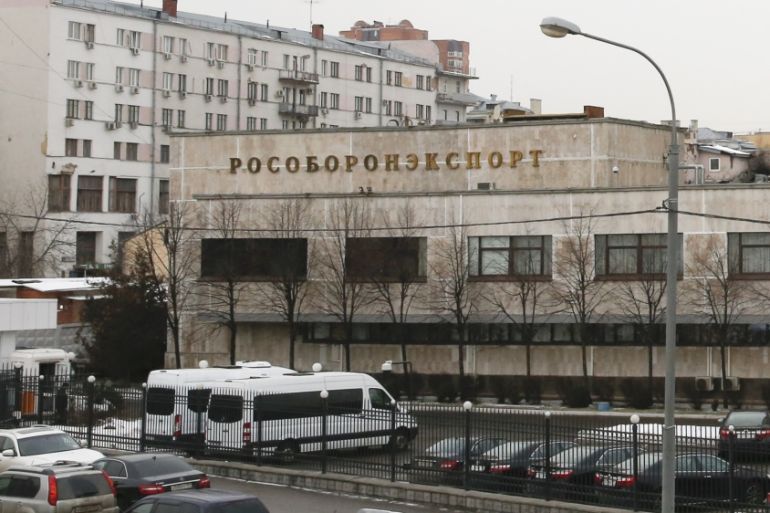US targets Russian oligarchs, officials with new sanctions
Treasury department says new sanctions target officials and businesses for their alleged roles in ‘malign activity’.

The US Department of the Treasury has announced new sanctions against seven Russian oligarchs, as well as several top government officials and business entities for their alleged roles in what the United States called “worldwide malign activity”.
Included in the list of individuals being targeted were Oleg Deripaska, a billionaire businessman and friend of Russian President Vladimir Putin, and the president’s son-in-law, Kirill Shamalov.
Keep reading
list of 4 itemsChina’s revised state secrets law has come into force. Here’s what to know
In Japan, book criticising trans ‘craze’ sparks rare culture-war skirmish
Former Binance CEO CZ sentenced to four months
“Russian oligarchs and elites who profit from this corrupt system will no longer be insulated from the consequences of their government’s destabilising activities,” a statement from the treasury department said on Friday.
“The Russian government engages in a range of malign activity around the globe, including continuing to occupy Crimea and instigate violence in eastern Ukraine, supplying the Assad regime with material and weaponry as they bomb their own civilians, attempting to subvert Western democracies and malicious cyber activities,” it added.
The US government said Deripaska had been investigated for alleged money laundering activities, as well as accusations of threatening the lives of business rivals.
|
|
Meanwhile, Putin’s son-in-law, Shamalov, is accused of acquiring a large number of shares of a Russia-based company involved in oil and gas exploration. Shamalov is married to Putin’s daughter, Katerina Tikhonova.
Also included were 17 government officials, the Russian Financial Corporation Bank and the state-owned Russian weapons trading company, Rosoboroneksport.
Rosoboronesksport is accused of assisting and providing financial, material, or technological support to the Syrian government.
Washington’s move means the assets of those sanctioned will be frozen in the US, while Americans will be blocked from doing business with them.
Al Jazeera’s Rory Challands, reporting from Russia’s capital, Moscow, said it is unclear whether the sanctions were going to affect Russian foreign policy.
“There is a wider debate that goes on in Western circles when it comes to how you can actually put pressure on the Kremlin. A lot of people have been arguing for some time that the only way you can squeeze the Kremlin is by going after those closest to it,” he said.
“But there are others who say this would actually benefit the Kremlin; that if you sanction these individuals they will be forced to bring their assets – which at the moment are spread around the world, often in countries like the UK – back to Russia, which has experienced horrendous capital flights in the last few years.
“That actually benefits the Kremlin, which has been trying to get all of this money [back].”
The following is a list of some of the individuals and entities targeted on Friday as described by the US Treasury Department:
OLIGARCHS:
- Igor Rotenberg, who acquired 79 percent of Russian oil and gas drilling company Gazprom Burenie from his father.
- Kirill Shamalov, who married Putin’s daughter in February 2013 following which “his fortunes drastically improved”. He acquired a large portion of shares in oil and gas exploration company Sibur.
- Oleg Deripaska, who has been investigated for money laundering and accused of extortion.
- Suleiman Kerimov, a member of the Russian Federation Council, who was detained in France in November, allegedly carrying 20m euro ($24.5m) in suitcases. He is accused of laundering money by buying villas.
- Apart from the seven oligarchs punished, 12 companies that they own or control were also sanctioned, including B-Finance based in the British Virgin Islands, Basic Element, EN+ Group, EuroSibEnergo (all linked to Deripaska), Gazprom Burenie, and Renova Group.
RUSSIAN STATE-OWNED FIRMS:
- Rosoboroneksport, a state-owned weapons trading company, which the US says has long-standing ties with the Syrian government. The US said that Moscow contributed to instability in Syria “through the sales and transfer of Russian-origin military equipment in support of [President Bashar al-] Assad’s regime, enabling Assad to continue carrying out attacks against Syrian citizens”. “These attacks have included chemical weapons attacks, which claimed the lives of hundreds of Syrian citizens.”
RUSSIAN GOVERNMENT OFFICIALS:
- Andrey Akimov, chairman of the management board of state-owned Gazprombank.
- Mikhail Fradkov, head of the Russian Institute for Strategic Studies, a research and analysis centre set up by the president.
- Alexey Dyumin, the governor of the country’s Tula region; he headed the Special Operations Forces that played a major role in the annexation of Crimea.
- Vladimir Kolokoltsev, the internal affairs minister.
- Vladislav Reznik, a member of the Duma.
- Evgeniy Shkolov, an aide to Putin.
- Alexander Torshin, a deputy governor of the central bank.